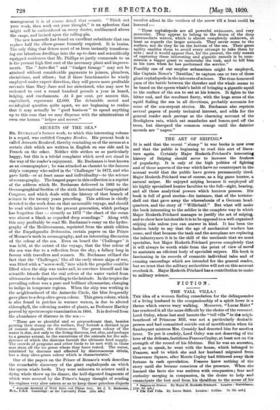SECRETS OF THE SEA.*
Ma. BUCHANAN'S former work, to which this interesting volume is a sequel, was entitled Comptes Rendus. His present book is called Accounts Rendered, thereby reminding us of the menus at a certain club which are written in 'English on one side and in French on the other. Neither title strikes us as particularly happy, but this is a trivial complaint which need not stand in the way of the reader's enjoyment. Mr. Buchanan is best known as an oceanographer ; he was attached as chemist to the famous ship's company who sailed in the ' Challenger' in 1872, and who gave birth—or at least name and individuality—to the science of oceanography. The longest paper in this collection is a reprint of the address which Mr. Buchanan delivered in 1895 to the Oceanographical Section of the sixth International Geographical Congress, and which deals with the history of that branch of science in the twenty years preceding. This address is chiefly devoted to the work done on that memorable voyage, and should be read with interest by the present generation, which perhaps has forgotten that c s recently as 1872 " the chart of the ocean was almost a blank as regarded deep soundings." Along with this may profitably be read Mr. Buchanan's essay on the hydro- graphy of the Mediterranean, reprinted from the ninth edition of the Encyclopaedia Britannica, certain papers on the Prince of Monaco's work in oceanography, and an interesting discussion of the colour of the sea. Even on board the ' Challenger' it was held, at the outset of the voyage, that the blue colour of the sea was due to a reflection from the sky, a fallacy long in favour with travellers and seamen. Mr. Buchanan utilized the fact that the ' Challenger,' like all the early steam ships of war, was fitted with a "screw-well," into which the propeller could be lifted when the ship was under sail, to convince himself and his scientific friends that the real polour of the water varied from
ultramarine to indigo according to the latitude. In the tropics the prevailing colour was a pure and brilliant ultramarine, changing to indigo in temperate regions. When the ship was working in the neighbourhood of the Antarctic Circle, the blue frequently gave place to a deep olive-green colour. This green colour, which is also found in patches in warmer waters, is due to altered chlorophyll, the colouring matter of plants, as Professor Hartley proved by spectroscopic examination in 1884. It is derived from the abundance of diatoms in the sea :—
" These are so plentiful and so preponderant that, besides putting their stamp on the surface, they furnish a distinct type of oceanic deposit, the diatom-ooze. The green colour of the water is due, not only to the living diatoms, but also, andperhaps to a greater extent, to the excretions of the animals for the sub- sistence of which the diatoms furnish the ultimate food supply. The crowds of penguins and other birds to be met with in these seas stain all the ice green where they have rested. The water, inhabited by diatoms and affected by diatomaceous debris, has a deep olive-green oolour which is characteristic."
One of the papers on the Prince of Monaco's work describes the remarkable discovery of the giant cephalopods on which the sperm whale feeds. They were unknown to science until a dying whale threw up its dinner, the half-digested fragments of which were secured by the Prince's happy thought of sending his engines very slow astern so as to keep these priceless disjecta
• Accoulas Rendered of Work Done and Things Seen. By J, Y, Buchanan. M.A.. Y.B,B. Cambridge : at the University Press. Ws. net.] membra afloat in the vortices Of the screw till a boat could be lowered :-
"These cephalopods are all powerful swimmers, and very muscular. They appear to belong to the fauna of the deep intermediate waters, which is almost completely unknown, at least as regards the larger animals. They never come to the surface, nor do they lie on the_bottom of the sea. Their great agility enables them to avoid every attempt to take them by nets ; and it would appear that, for the present, the only means of capturing these interesting and gigantic saunas is to com- mission a bigger giant to undertake the task, and to kill him in his turn when he has performed the service."
Possibly one of our surplus submarines might be employed, like Captain Nemo's ' Nautilus,' to capture one or two of these giant cephalopods in the interests of science. The time-honoured yarn of the battle between the thresher and the whale seems to be based on the sperm whale's habit of bringing a gigantic squid to the surface of the sea to eat at his leisure. It fights to the bitter end, and the resultant flurry, with the huge arms of the
squid flailing the sea in all directions, probably accounts for some of the sea-serpent stories. Mr. Buchanan also ,reprints several papers of purely technical interest, and adds for the general reader such parerga as the charming account of the Bordighera rats, which eat mandarins and lemon-peel off the trees, but disregard the common orange until the daintier
morsels are "napoo."






































 Previous page
Previous page